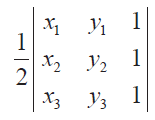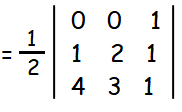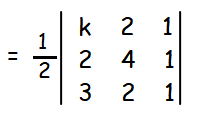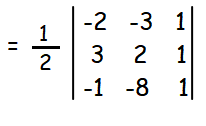AREA OF TRIANGLE USING DETERMINANT FORMULA
Here we are going to see, how to find the area of a triangle with given vertices using determinant formula.
We know that the area of a triangle whose vertices are (x1 , y1),(x2 , y2) and (x3 , y3) is equal to the absolute value of
(1/2) [x1 y2 - x2y1 + x2y3 - x3y2 + x3y1 - x1y3]
This expression can be written in the form of a determinant as shown below.

Note :
The area of the triangle formed by three points is zero if and only if the three points are collinear.
Also, we remind the reader that the determinant could be negative whereas area is always non negative.
Practice Problems
Problem 1 :
Find the area of the triangle whose vertices are (0, 0), (1, 2) and (4, 3).
Solution :
Let the point be (x1, y1) ==> (0, 0), (x2, y2) ==> (1, 2) and (x3, y3) ==> (4, 3)

= (1/2)[3 - 8]
= (1/2)[-5]
= 5/2
= 2.5
Area cannot be represented with negative. So, area of the triangle with given vertices is 2.5 square units.
Problem 2 :
If (k, 2), (2, 4) and (3, 2) are vertices of the triangle of area 4 square units then determine the value of k.
Solution :
Area of triangle = 4 square units

(1/2){k [4 - 2] - 2[2 - 3] + 1[4 - 12] } = 4
k(2) - 2(-1) + 1(-8) = 8
2k + 2 - 8 = 8
2k - 6 = 8
2k = 8 + 6
2k = 14
k = 7
So, the value of k is 7.
Problem 3 :
Find the area of the triangle whose vertices are (-2, -3), (3, 2), and (-1, -8).

= (1/2) [ -2(2 + 8) + 3(3+1) + 1(-24 + 2) ]
= (1/2) [-2 (10) + 3(4) + 1(-22)]
= (1/2) [ -20 + 12 - 22]
= (1/2) [ -42 + 12]
= (1/2) (-30)
= -15
So, the required area is 15 square units.
Kindly mail your feedback to v4formath@gmail.com
We always appreciate your feedback.
©All rights reserved. onlinemath4all.com
Recent Articles
-
Digital SAT Math Problems and Solutions (Part - 150)
Apr 25, 25 11:46 AM
Digital SAT Math Problems and Solutions (Part - 150) -
AP Calculus AB Problems with Solutions (Part - 19)
Apr 24, 25 11:10 PM
AP Calculus AB Problems with Solutions (Part - 19) -
AP Calculus AB Problems with Solutions (Part - 18)
Apr 24, 25 11:06 PM
AP Calculus AB Problems with Solutions (Part - 18)
